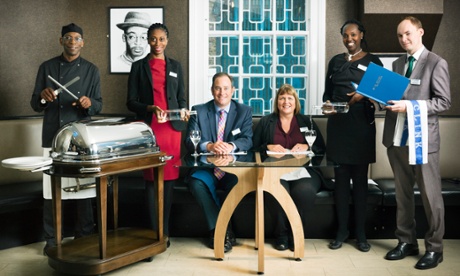
A waiter, in a smart, checked waistcoat, reels off a list of today’s ice-cream flavours, all made in-house: “Strawberry, stem ginger, rum and raisin …”
“Rum?” says Ross Wryde, my dining companion, with a smile and a raised eyebrow. “How d’you get that in?”
The question is a valid one. The Clink in Brixton may just look like an upscale restaurant – and it certainly serves very good, impeccably seasonal food – but it faces constraints that other dining establishments do not. No alcohol is allowed on the premises; even yeast is banned, in case the chefs or waiters use it to knock up a batch of moonshine. There are a number of other restrictions, too, that come from being located behind the razor-wired walls of Brixton Prison. Because, with the exception of a head chef and a couple of front-of-house welcomers, the Clink is staffed entirely by inmates.
Our waiter explains that the rum arrived in a “controlled product”, in the Christmas cake mixture. Wryde nods, and orders the “raspberry collection” – a technically dazzling dessert with the fruit used four ways – instead. “And, oh yeah,” he says, calling the waiter back. “Bring a shot of rum with it as well, will you?”
Constraints can sometimes be the making of a restaurant and that’s exactly how it is with the Clink, the winner of OFM’s Best Ethical Restaurant: as well as Brixton, there’s the original Clink at HMP High Down in Surrey ; there are also outposts just outside the prison walls in Cardiff and an all-female operation in Styal in Cheshire (these don’t require reservations or background checks). What might have been viewed as a novelty idea when it was launched in 2009 is turning out to be a revolutionary dining concept. The Clinks in High Down, Cardiff and Styal are all rated on Tripadvisor as the finest restaurants in their area; Brixton, meanwhile is considered the 17th best “place to eat” (from more than 18,000 options) in all of London.
“I get a bit embarrassed with Tripadvisor,” says Chris Moore, chief executive of the Clink Charity. “We are a training college after all. If we burn the main course, that’s OK. I want the guys to make their mistakes here; I don’t want them to make them when they start working outside.”
Ethical considerations are at the heart of Clink. The four kitchens only use British produce, in season, from local suppliers. Much of this comes from gardens at HMP Send in Surrey and from HMP Prescoed in Wales, which has 90 woodland chickens and Welsh Black cattle. At High Down, there are a dozen beehives – the honey infused by nearby lavender fields – and a greenhouse heated by biodiesel converted from fryer oil. All Clinks scrupulously recycle glass, cans and cardboard, and compost all food waste.
“Sustainability is very important for us,” says Moore, who worked in hospitality at Harrods and Fenwick department stores (he changed tack in 2011 after a heart bypass). “But the most important thing is sustainability of people.”
He is talking about prisoner rehabilitation, which he believes is the greatest achievement of the Clinks. There have now been almost 200 graduates of the scheme since a chef, Alberto Crisci, then chief catering manager at HMP High Down, came up with the idea six years ago and rates of reoffending have been, Moore says, “dramatically reduced”. Clinkers have found work in restaurants across the UK, including Wahaca, Locanda Locatelli and Carluccio’s. Moore has plans for 10 trainee projects (both restaurants and inmate-run gardens) by 2017
Wryde is a perfect example of the opportunities the Clink can offer. He became a drug addict as a teenager and ended up in High Down after spells in foster care and a young offenders’ institution. He admits he couldn’t even burn toast when he had his first interview with Crisci. “I didn’t know what parsley was or coriander,” he recalls. “I used to go to the fridge and come back an hour later with something totally wrong.”
Five years out of prison, now aged 32, Wryde had a spell working at the Lancaster London Hotel, rising up the ranks to their fine-dining restaurant, and he then became reservations manager for the Clink restaurants. Now he’s looking for a new challenge in the hospitality industry. .“It’s time to take the stabilisers off,” says Wryde. “But I feel like I owe the Clink my life. I might have ended up killing myself. I’d have certainly ended up back inside without it. It totally changed my life.”
theclinkcharity.org; The Clink Canape Cookbook – with recipes from prisoners as well as Albert Roux, Giorgio Locatelli and Thomasina Miers – is out on 12 November, £14.99. All proceeds go to Clink

